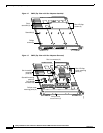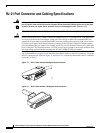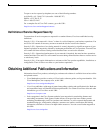
28
Catalyst 6500 Series Switch and Cisco 7600 Series Router CMM Installation and Verification Note
78-14107-07
Configuring the Port Adapter Ports
Configuring the Port Adapter Ports
Configuring the CMM interfaces is similar to configuring the voice interfaces on other Cisco products.
CMM interface configuration requirements are dependent on your AVVID network requirements. For
interface configuration procedures, refer to the Cisco IOS Voice, Video, and Fax documentation for your
release at this URL:
http://www.cisco.com/univercd/cc/td/doc/product/software/index.htm
Note The CMM requires a static IP address. Obtaining an IP address through a DHCP server is not supported.
You assign an IP address to the CMM Gigabit Ethernet backplane interface through the CLI by using the
interface GigabitEthernet1/0 command.
Configuring the Port Adapter Clock Source
The CMM T1/E1 port adapter clock configuration is the same as the configuration on many other Cisco
gateways. The CLI commands that are used for configuring the clock are identical to other gateways. To
set clocking for individual T1 or E1 ports, enter the clock source command in controller configuration
mode as follows:
clock source {line [primary | secondary {1..17}] | internal}
To return to the default configuration, use the no clock source command.
Note We do not recommend that you use the clock source line command. You must enter either the clock
source line primary command or the clock source line secondary command.
If you configure the clock source for a port adapter port as primary, the Rx clock that is received from
the remote end is used to supply the clock for all CMM T1/E1 ports that are configured for the internal
clock on that CMM. Only one port adapter port can be configured as the primary clock source on a
CMM. If you do not configure any of the port adapter ports as the primary clock source, the internal
TDM system clock uses the free running clock on one of the port adapters.
If you configure the clock source for a port adapter port as secondary, you must also specify the priority
preference level of the source. The system automatically switches among the secondary sources to use
the highest level of preference that has the Rx clock available when the specified primary clock source
is absent.
If you configure the clock source for a port adapter port as internal, the port uses the clock that is
provided by the system. This system clock could be a CMM internal clock or the Rx clock from the port
that is configured as the primary clock source.


















